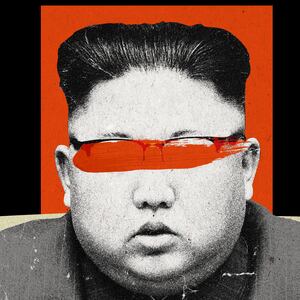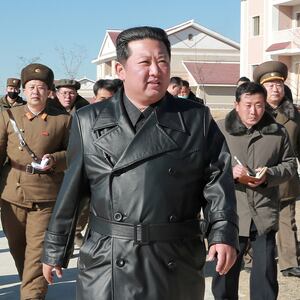SEOUL—North Korea is placing as much emphasis on producing manure as it is on firing missiles, and it doesn’t matter whether it comes from people or animals.
While test-firing two missiles in less than a week, North Korea has been waging “the battle for manure,” which is far more vital for average North Koreans than the splash of another test-shot into the sea off the east coast.
The quest has reached crisis level over the past two years as fertilizer almost stopped coming in from China after North Korea’s leader Kim Jong Un closed borders at the outset of the COVID-19 pandemic. And then, last March, the North refused donations from South Korea while demanding an end to U.S. and UN sanctions.
The urgency of the quest “doesn’t sound like ‘BS’ to me,” Victor Cha, who is in charge of North Korea issues at the Center for Strategic and International Studies in Washington, told The Daily Beast. “It’s an interesting commentary that ‘smells’ of how serious the crop situation is without the annual fertilizer shoveled out by South Korea.”
And it’s all happening, said Cha, while “we are constantly digging ourselves out of the crap created by the latest North Korean missile launches,” most recently on Tuesday.
Just to make sure everyone gets the need to produce enough excrement in a hurry, according to Daily NK, which monitors North Korea from inside the country, entry into markets is closed to those who fail to fulfill their quotas.
With manure, not missiles, ranking as “the first struggle” for the new year, said Daily NK, authorities were “essentially pressuring people” to qualify for a “manure pass” just as South Korean citizens need “quarantine passes” certifying they are vaccinated against COVID-19.
Quotas for producing manure range from 200 kilograms for each household t0 500 kilograms for everyone working in state factories, Daily NK reported, but people did get one break. Markets this month began opening an hour later in the afternoon, from 3 to 5 rather than 2 to 5, to give “an extra hour to produce manure.”
How people are to contribute so much manure in a country where animals are in short supply is not clear, but the term “homemade” comes up frequently in reports in the North Korean media heaping praise on efforts to spread enough manure ever since sanctions and COVID-19 began seriously cutting off supplies from China and South Korea in 2020.
“Homemade” by definition covers manure made from excrement of any kind, human or animal, together with weeds, garbage and even ash rich in chemicals. Presumably oxen, on which farms typically rely rather than machinery to till the fields, are also a major source.
In one district in Pyongyang, according to the English-language Pyongyang Times, a cooperative farm spread “hundreds of tons of homemade manure per hectare of vegetables.” Another district produced 1.2 times as much “homemade manure” for potato farming as the year before.
The North Korean propaganda machine does not frame the struggle in terms of incentives or punishment but reports on the manure campaign with an enthusiasm usually reserved for missile launches.
People in Jagang Province, up by the Chinese border, “carried tens of thousands of tons of manure to co-op farms in three days through this year’s first campaign,” said one breathless report carried by Pyongyang’s Korean Central News Agency. “Officials of the provincial institutions took the lead in the campaign, guiding the transport of manure to farm fields.”
Down in South Hwanghae Province, on the Yellow Sea southwest of Pyongyang, North Korea’s Premier Kim Tok Hun, visiting a fertilizer factory earlier this month, called for “carpeting” farmland “with good-quality manure” for “decisively increasing the fertility of the soil.”
Urine is also in demand, according to Radio Free Asia, a U.S.-funded website that often reports from contacts inside North Korea. The rural management commission in one province bordering China “instructed the farmers to donate their urine to be mixed into the compost,” RFA reported in May.
RFA quoted one source as saying workers were “forced to bring two liters of urine per person per day to mix into the compost pile until the production goal is achieved” and had to “keep track of their donated urine in a record book.”
Such reports seemed intended to increase rivalry among regions as well as officials and individuals for the honor of producing the most manure.
“The authorities are apparently generating an atmosphere of competition,” said Daily NK, reporting that directors and officials were “focused on fulfilling their quotas, afraid that units that fall behind will face ‘thorough review’—a euphemism obviously for severe punishment.” Low-level officials “are protecting themselves,” said the report, by imposing fines on those who failed to meet quotas.
Kim Jong Un in meetings with leaders of the ruling Workers’ Party, of which he is general secretary, has repeatedly placed top emphasis on agriculture. In his final speech to party members at the end of the year, according to KCNA, he said the country faced “a great life-and-death struggle” requiring “radical progress in solving the food, clothing and housing problem”—language that would seem to make clear he’s more interested in feeding his people than firing missiles.
Kim didn’t get into specifics in his speech, but KCNA quoted him in 2014 advising agricultural leaders to “use all sources of manure such as domestic animal excrement, night soil [human excrement], compost and ditch-bed soil.”



